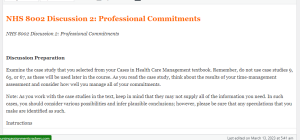NHS 8002 Discussion 2: Professional Commitments
NHS 8002 Discussion 2 Professional Commitments
Discussion Preparation
Examine the case study that you selected from your Cases in Health Care Management textbook. Remember, do not use case studies 9, 65, or 67, as these will be used later in the course. As you read the case study, think about the results of your time-management assessment and consider how well you manage all of your commitments.
Note: As you work with the case studies in the text, keep in mind that they may not supply all of the information you need. In such cases, you should consider various possibilities and infer plausible conclusions; however, please be sure that any speculations that you make are identified as such.
Instructions
Today’s working professionals are often challenged with juggling and balancing the demands of their work, families, and social lives while making important decisions concerning the success of their professions and organizations.
For this discussion, use the following:

The information presented in your chosen case study.
The results of your Time Management Action Plan.
The information in the journal article you located in the second study in this unit.
Analyze the selected case study using a time-management framework. Note: Do not use the questions given at the conclusion of the case study. Instead, use the following prompts to develop your post to this discussion:
If you were the leader in this case study, how would you make key decisions on how to manage your time effectively and balance your daily commitments and responsibilities while working to resolve the situation? Would you need to reprioritize?
How would you ensure that daily functions of the organization and your personal life keep running smoothly?
What information presented in your selected journal article might help you make those decisions?
How do effective time-management strategies support leadership development in health care?
Identify your case study in the subject line of your discussion post, (for example, Case 13: Disorder in the House).
Response Guidelines
Read as many posts as time allows. Please choose posts that have had few responses thus far and refer to the Faculty Expectations Message for discussion response guidelines. Try to respond to someone who chose a case study other than yours. Briefly review his or her case study to get some context before reading the post. In your response, address the following:
What are your perspectives on the time-management plan described by your peer?
Are there things you would do differently?
Discussion Preparation
Complete the Time Management Action Plan from this unit’s first study. Be sure to e-mail the results to yourself.
Instructions
As you completed the Time Management Action Plan, which areas stood out as needing improvement? Reflect on the priorities in your life right now. Think about how you will plan for unexpected life events.
What are your thoughts on, and plans for, setting aside the time you need for your educational program, while ensuring that you are also taking care of your professional work, your family responsibilities, and yourself? Were there any relevant tips in your unit readings or the journal article you located that can help you with these things?
Response Guidelines
Please read as many posts as time allows. Please choose posts that have had few responses thus far and refer to the Faculty Expectations for Response Guidelines. Share a success story from your own experiences that might be helpful to others in managing time effectively.
NHS 8002 Discussion 2 Professional Commitments Grading Rubric Guidelines
| Performance Category | 10 | 9 | 8 | 4 | 0 |
| Scholarliness
Demonstrates achievement of scholarly inquiry for professional and academic decisions. |
|
|
|
|
|
| Performance Category | 10 | 9 | 8 | 4 | 0 |
| Application of Course Knowledge –
Demonstrate the ability to analyze, synthesize, and/or apply principles and concepts learned in the course lesson and outside readings and relate them to real-life professional situations |
|
|
|
|
|
| Performance Category | 5 | 4 | 3 | 2 | 0 |
| Interactive Dialogue
Replies to each graded thread topic posted by the course instructor, by Wednesday, 11:59 p.m. MT, of each week, and posts a minimum of two times in each graded thread, on separate days. (5 points possible per graded thread) |
|
Summarizes what was learned from the lesson, readings, and other student posts for the week. |
|
|
|
| Minus 1 Point | Minus 2 Point | Minus 3 Point | Minus 4 Point | Minus 5 Point | |
| Grammar, Syntax, APA
Note: if there are only a few errors in these criteria, please note this for the student in as an area for improvement. If the student does not make the needed corrections in upcoming weeks, then points should be deducted. Points deducted for improper grammar, syntax and APA style of writing. The source of information is the APA Manual 6th Edition |
|
|
|
|
|
| 0 points lost | -5 points lost | ||||
| Total Participation Requirements
per discussion thread |
The student answers the threaded discussion question or topic on one day and posts a second response on another day. | The student does not meet the minimum requirement of two postings on two different days | |||
| Early Participation Requirement
per discussion thread |
The student must provide a substantive answer to the graded discussion question(s) or topic(s), posted by the course instructor (not a response to a peer), by Wednesday, 11:59 p.m. MT of each week. | The student does not meet the requirement of a substantive response to the stated question or topic by Wednesday at 11:59 pm MT. |

